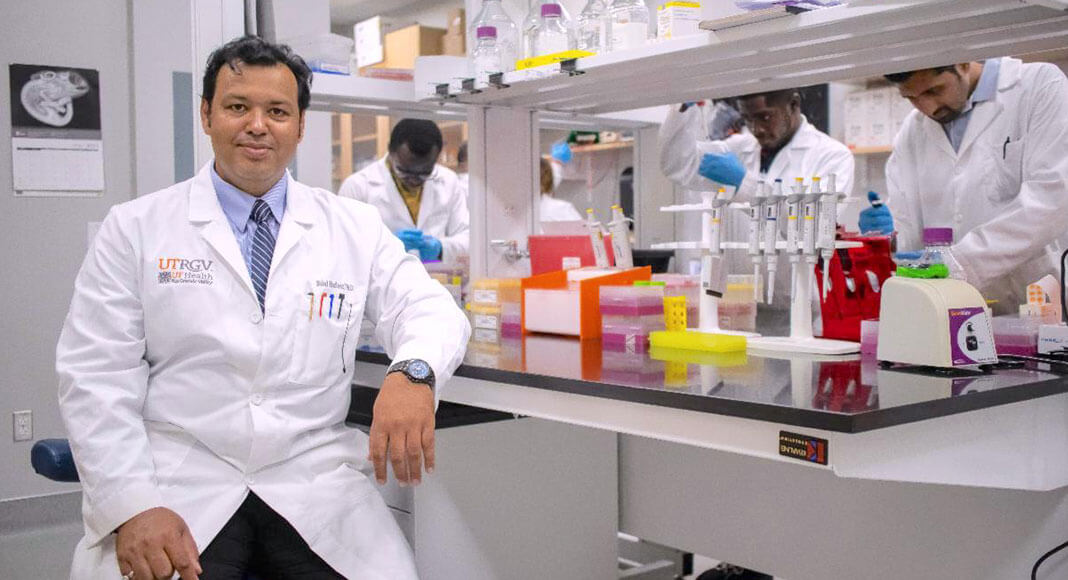
Mega Doctor News
By Maria Gonzalez
RIO GRANDE VALLEY, TEXAS – The UTRGV School of Medicine was recently awarded a $1.45 million grant from the National Institutes of Health (NIH) to support its goal of developing a treatment for advanced pancreatic cancer.
Dr.Bilal Bin Hafeez, principal investigator and assistant professor in the Department of Immunology and Microbiology at the UTRGV School of Medicine, received the grant for his research proposal – “Targeting ribosome biogenesis and desmoplastic tumor microenvironment for the treatment of advanced pancreatic cancer.”
The focus of Hafeez’s research is to identify new molecular targets which can be rationally used for developing new strategies for the prevention and treatment of advanced solid tumors, specifically prostate and pancreatic cancer. In addition, the goal of the research is to develop new genetically engineered mouse models of cancer and identify small new molecules and drugs that have the potential for improving checkpoint blockade immunotherapy in less responsive tumors.
“The goal of this research is to ultimately develop a treatment for advanced pancreatic cancer,” said Hafeez. “Our findings will contribute to a more thorough understanding of how the process of ribosome biogenesis plays a pivotal role in pancreatic cancer development in the human body.”
Dr. Parwinder Grewal, executive vice president for Research and New Program Development at UTRGV, said the grant will go a long way in helping fight this disease.
“We are very excited about this new NIH grant that will allow Dr. Hafeez to develop new treatments for this deadly disease,” said Grewal.
The work of Hafeez and his research team will exclusively make use of the competitive grant award for pancreatic cancer research. His research team includes Paola Ibarra, biomedical sciences major and undergraduate research assistant/lab technician from Rio Grande City; Carlos Perez, biochemistry and molecular biology major and graduate assistant from Harlingen; Asif Shahriar, master’s student in biochemistry and molecular biology and graduate research assistant from Edinburg; Emmanuel Anning, Pharm.D. graduate and graduate research assistant from Ghana, West Africa; and Saba Suleman, third-year medical student and graduate research assistant from Brownsville.
Dr. Subhash C. Chauhan, department chair, professor, and director of the Institute for Cancer Immunotherapy, said the research will help shed light on the pathogenesis of pancreatic cancer, which is the most lethal disease with a very poor prognosis and survival rate.
“The Department of Immunology and Microbiology is fully committed to cancer research enhancement in Rio Grande Valley,” said Chauhan. “The successful completion of this research will have an important impact on reducing mortality in human pancreatic cancer patients and set a strong foundation to develop a new research direction at UTRGV.”
Hafeez extended his gratitude to department colleagues and research collaborators Dr. Subhash Chauhan, Dr. Murali Yallapu, Dr. Meena Jaggi, Dr. Sheema Khan, Dr. Manish Tripathi, Dr. Dae Joon Kim, and Dr. Tamar Oraby (co-investigator).He also thanked his national and international collaborators – Dr. Brendan Frett, University of Arkansas for Medical Sciences; Dr. Adeel Ahmad, West Virginia University; Dr. Manu M. Sebastian, The University of Texas MD Anderson Cancer Center; and Dr. Absarul Haque, King Abdulaziz University Jeddah, Saudi Arabia – who are actively supporting his research.








